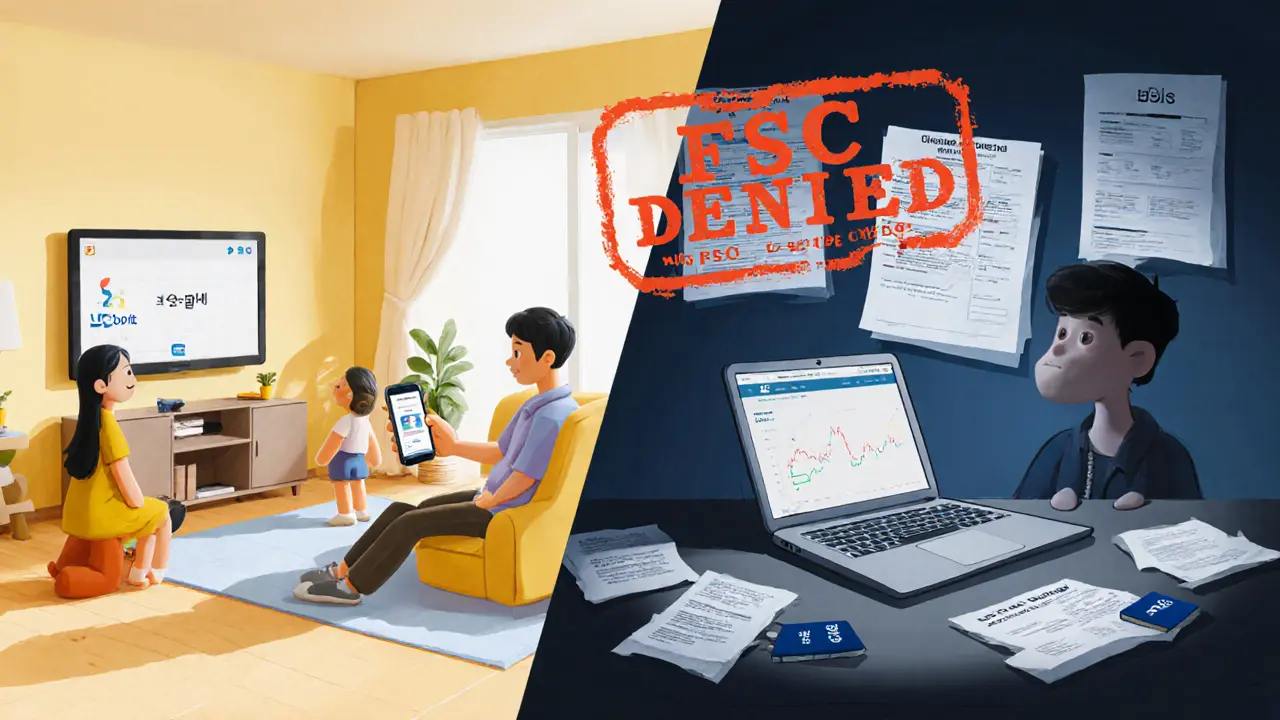BTCC Crypto Exchange Review: Is It Right for Korean Traders in 2025?
 Jul, 11 2025
Jul, 11 2025
BTCC Leverage Calculator for Korean Traders
Calculate Your Position Size
Results
Important Risk Warning: Trading with 100x leverage can result in total loss of your capital within minutes. This tool is for educational purposes only. BTCC is not licensed in Korea and lacks local support. You are responsible for understanding all risks before trading.
If you're a crypto trader in South Korea wondering whether BTCC is worth your time, the short answer is: it depends on what you're looking for. BTCC isn't a Korean exchange. It doesn't let you deposit Korean Won (KRW) directly. It doesn't have a Korean-language app. And it doesn't answer your support tickets in Hangul. But if you're after high-leverage futures, deep liquidity, and advanced trading tools, BTCC might be the only exchange that truly fits your needs.
What BTCC Actually Is (And Isn't)
BTCC started in Shanghai in 2011 as BTC China-one of the first three big crypto exchanges in China. After China banned crypto trading in 2017, BTCC shut down its local operations and moved its headquarters to London. Today, it’s a global platform focused on derivatives trading, not a local Korean service. There’s no official “BTCC Korea” entity. Korean users access the same global platform as users in the U.S., Europe, or Singapore. That means you won’t find KRW deposit options. No bank transfers. No credit card buys. You can’t just log in and fund your account like you can on UPbit or Bithumb. Instead, you need to buy USDT or BTC on another exchange-like Kraken or Binance-then send it over. That adds time, cost, and complexity. For beginners, that’s a dealbreaker. For experienced traders, it’s just another step in the workflow.Trading Tools That Actually Stand Out
Where BTCC shines is in its trading engine. It handles 100,000 trades per second with an average execution time of just 1.2 milliseconds. That’s faster than most Korean exchanges. Its order book depth for BTC/USDT futures is 12.7 times deeper than what you’ll find on UPbit, according to professional trader measurements. That matters when you’re placing large orders-less slippage, better fills. BTCC offers perpetual futures on over 60 coins, including BTC, ETH, SOL, and DOGE. You can trade with up to 100x leverage. Compare that to Korea’s legal limit of 5x on domestic exchanges. For traders who understand risk and want to amplify positions, that’s a massive advantage. BTCC also offers tokenized futures on stocks and commodities like Apple shares and gold-all settled in USDT. No other Korean exchange gives you that. Fees are standard: 0.1% maker, 0.1% taker. But if you trade over $50 million a month, fees drop to 0.02% maker and 0.04% taker. That’s competitive with Binance or Bybit. Korean exchanges don’t offer volume discounts this aggressive.Security and Compliance: Strong Globally, Weak Locally
BTCC keeps 98% of user funds in cold storage. It uses multi-signature wallets and requires two-factor authentication. In its 2025 audit, CryptoSecurity Labs gave BTCC a 4.1/5 security rating-higher than most Korean exchanges. It also publishes proof-of-reserves monthly, which builds trust. But here’s the catch: BTCC doesn’t hold a Korean financial license. It’s not registered with the Financial Services Commission (FSC). That means it can’t offer services that local exchanges can-like automatic tax reporting for Korea’s 22% capital gains tax. You’re on your own to track gains and file returns. Many users report spending hours manually calculating profits and losses. Korea’s Virtual Asset User Protection Act requires exchanges to get ISMS certification and store funds in separate cold wallets. BTCC meets these standards globally, but doesn’t advertise compliance for Korean users. That creates a gray area. If the government cracks down on unlicensed platforms in 2026, BTCC could face restrictions.
Why Korean Users Are Frustrated
Most Korean traders who use BTCC do so reluctantly. The biggest complaints? No KRW deposits, slow customer support, and poor Korean localization. On Trustpilot, Korean users rate BTCC just 2.9/5-far below its global average of 3.8/5. Common feedback: “It takes 18 hours to get a reply.” “The app is in English only.” “I tried to send KRW to Kraken to buy USDT, but my bank blocked it.” Korean users must complete international KYC with a passport, not a resident registration number. Onboarding takes 36-48 hours. On UPbit, it’s 15 minutes. And BTCC’s Korean translation is machine-generated. A 2025 survey found only 43% of Korean users rated the localization as “adequate.” UPbit scored 89%. There’s also a cultural gap. Korean crypto communities thrive on Discord servers and Naver Cafés. UPbit’s official Korean Discord has over 87,000 members. BTCC has one small Telegram group with 3,241 members. If you need help, you’re mostly on your own.Who Should Use BTCC in Korea?
BTCC isn’t for everyone. But it’s perfect for a specific type of trader:- You trade futures regularly and want leverage higher than 5x.
- You’re comfortable moving funds between exchanges to fund your account.
- You understand tax reporting and can track your own gains.
- You prioritize speed, depth, and advanced tools over convenience.
- You trade over $50,000 a month and want lower fees.

Recent Updates and What’s Coming
In October 2025, BTCC integrated Ripple’s ODL system to speed up USDT conversions. Internal tests show this could cut Korean user onboarding time by 28%. That’s a step in the right direction. BTCC also announced plans to open a Seoul-based compliance team by Q2 2026. That doesn’t mean KRW deposits are coming. But it signals they’re taking the Korean market seriously. Still, the Financial Services Commission’s “KRW-only” policy for domestic exchanges makes full localization unlikely anytime soon. Deloitte Korea predicts BTCC’s market share in Korea will stay under 2% unless it gets licensed locally. Without that, it’ll remain a niche tool for advanced traders-not a mainstream option.The Bottom Line
BTCC is not a Korean exchange. It’s a global derivatives powerhouse that Korean traders use despite its flaws. If you need deep liquidity, high leverage, and fast execution, BTCC delivers. But if you want simplicity, local support, or direct KRW deposits, you’ll be better off with UPbit or Bithumb. The choice comes down to this: Do you want convenience-or capability? Most Korean traders pick convenience. The pros pick BTCC.Can I deposit Korean Won (KRW) directly into BTCC?
No, BTCC does not support direct Korean Won deposits. You must first buy USDT or BTC on a Korean exchange like UPbit or Bithumb, then transfer it to your BTCC wallet. This adds steps and delays compared to local exchanges that accept bank transfers and credit cards.
Is BTCC safe to use in South Korea?
BTCC has strong global security: 98% cold storage, multi-sig wallets, and proof-of-reserves. Its 2025 audit scored 4.1/5 for security. However, it lacks a Korean financial license, meaning it doesn’t comply with local regulations like the Virtual Asset User Protection Act. This creates legal uncertainty-your funds are technically safe, but you’re using an unlicensed platform.
What’s the maximum leverage on BTCC compared to Korean exchanges?
BTCC offers up to 100x leverage on perpetual futures. In contrast, South Korean exchanges are legally capped at 5x leverage due to FSC regulations. This makes BTCC the only viable option for traders seeking high leverage, though it comes with significantly higher risk.
Does BTCC provide tax reports for South Korea?
No, BTCC does not generate tax reports aligned with South Korea’s 22% capital gains tax. Users must manually track all trades, calculate profits and losses, and file returns themselves. This is a major drawback for Korean residents who want automated compliance.
Why do Korean users complain about BTCC’s customer service?
BTCC’s support team is based overseas and primarily responds in English. Korean users report average response times of 18 hours, compared to under 2 hours on UPbit. There’s no dedicated Korean-speaking support team, and the mobile app lacks Korean language options, making communication difficult.
Is BTCC better than Binance for Korean traders?
Binance supports KRW deposits and has a Korean-language interface, making it easier for beginners. But BTCC offers deeper futures liquidity and higher leverage (100x vs. 20x on Binance). For advanced traders focused on derivatives, BTCC is superior. For casual users, Binance is more convenient.
Can I use BTCC if I’m under 18 in South Korea?
Yes, BTCC doesn’t enforce age restrictions based on location. However, South Korean law requires users to be 18+ to hold cryptocurrency. Even if BTCC allows underage accounts, you’d still be violating local regulations. Most Korean exchanges block users under 18 during KYC.
How does BTCC’s fee structure compare to UPbit?
BTCC charges 0.1% maker and taker fees, dropping to 0.02% and 0.04% for high-volume traders. UPbit charges 0.15% for both maker and taker on spot trades, with no volume discounts. For futures trading, BTCC is significantly cheaper and more transparent. But UPbit offers free KRW deposits and withdrawals, which BTCC doesn’t.
Rachel Thomas
November 26, 2025 AT 17:46if you need 100x to make profit you're already broke
Kristi Malicsi
November 28, 2025 AT 16:45if you need krw deposits and korean support you're not here to trade you're here to gamble with a safety net
btcc doesnt care if you cry about the language barrier its not a customer service app its a trading terminal
Mark Adelmann
November 28, 2025 AT 20:23upbit is nice for buying btc with your paycheck but if you're placing 50k orders you need the depth and speed btcc gives you
yes you gotta move usdt first but thats like complaining your race car doesnt have cup holders
ola frank
November 28, 2025 AT 22:08btcc's global security architecture is technically superior but the absence of fsc compliance introduces systemic counterparty risk specific to korean residents
the 22% capital gains tax burden is non-trivial and the lack of api-integrated reporting creates significant operational friction
while the 100x leverage offers theoretical arbitrage potential the legal exposure may outweigh marginal gains
the institutional-grade infrastructure is impressive but jurisdictional arbitrage is a double-edged sword
Vaibhav Jaiswal
November 28, 2025 AT 22:43theyre mad because they cant just tap a button and buy btc with their bank
but then they wonder why they lose money every time the market moves
btcc doesnt hold your hand but it doesnt lie to you either
if you want to be a trader not a tourist get used to it
Ian Esche
November 29, 2025 AT 02:57get over it
if you want to trade like a pro you dont get to cry about language or krw deposits
btcc is the real deal and the rest are just kids with credit cards
Angel RYAN
December 1, 2025 AT 00:11btcc is clearly built for serious traders and its amazing for that
but if you're a korean user who just wants to buy some btc and sleep at night you're gonna be frustrated
maybe the real win is using upbit for spot and btcc for futures
no one has to choose one or the other
Sierra Myers
December 2, 2025 AT 09:13why would you use this when you can get everything on binance with krw and better support?
Tony spart
December 3, 2025 AT 10:55btcc is built by real traders for real traders
if you cant handle moving usdt from upbit to btcc then you dont belong here
your bank blocked your krw transfer? good
that means you're not ready to trade
stop crying and learn how the real world works